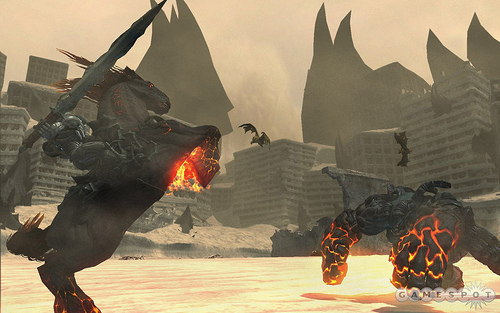This post has not been edited by the GamesBeat staff. Opinions by GamesBeat community writers do not necessarily reflect those of the staff.
I can't imagine all the hate mail any reputable video game magazine receives after every issue comes out; in dealing with editor reviews that is. In what is an obvious "personal opinion" section, editors and reviewers are often chastised for having a personal opinion and viewpoint on a game they love or hate. Even the forums on major websites (IGN, 1up, etc.) feature countless obscenities against the reviewer based on a review they gave on a particular game.
So this begs the question: Does a bad review officially make the game bad? 
In defense of the reviewer, their review is written from their personal perspective. Meaning it is one person's opinion on what "they themselves" thought of the game. We have to realize that just because Destructoid gave Alpha Protocol a 2.0 does not mean it is an overall bad game (even though they do specifically state "it's absolutely dreadful"). Keep in mind this is the same game site that gave Deadly Premonition a 10, which IGN gave a 2.0 as well.
Readers read reviews mostly so they can decide if the game is worth purchasing or not. They read one person's opinion on it, and for some reason they constitute it as their own opinion, before they themselves even play the said game. Why is that (besides not wanting to waste $60)?
Gullibility. Reviewers swear that they have no say in video game sales, but in all reality they do to a certain extent. I've heard the same song and dance from countless gamers: "I'm not going to buy it because Game Informer gave it a 5 out of 10." Imagine for a second, if God of War III got a 5.0 instead of a 10 (in some backward universe). Would it have sold as much as it did? I guarantee you it wouldn't have. Final Fantasy XIII wasn't the Final Fantasy many were looking for, but it wasn't a bad game overall (so says PSU). Many reviewers gave it a bad rating because it wasn't the Final Fantasy they were looking for (so says VideoGamer).
And now maybe out there is someone who felt God of War III should have gotten a 5 out of 10, but that in itself does not title it as a "bad game." We as gamers need to look at "personal opinions" as what they really are: personal opinions. Here are some theories I have for readers/gamers, AND reviewers for magazines and websites.
For the gamers:
-Do your research. Metacritic, although their overall rating system is stern but fair in a sense, provides a great starting point for reading multiple reviews on a game by various media outlets. Type in Alpha Protocol and what comes up is over 20 reviews by various media outlets (IGN, Gamepro, Game Informer, etc.) and their overall score. You'd be surprised how varied these are. It even has good reader reviews too!
-Don't be so critical. We as gamers are spoiled by the high production values like Call of Duty, Mass Effect , Final Fantasy and Madden that anytime another game comes out in the same genre, it is held in a side by side comparison. Of course Split/Second is not Burnout (see Gamer Limit)! Last I checked, they are two different games!
-Leave your expectations at the title screen. If you go into any new game expecting something specific, you'll more than likely be disappointed if it doesn't make the cut. This skews your opinion of the game, and may cause you to put the controller down for good. Keep an open mind, and you'll be surprised. Deadly Premonition was priced at $20, so naturally I didn't expect a high production value like Resident Evil 5. And I was surprised in the gold I found.
For the reviewers:
-Offer multiple opinions in one piece. EGM had the right idea (and they still do in both print and in EGMi) by reviewing a game and offering at least 3 opinions on the game. This is a brilliant way to get multiple minds together to talk about a game, and to have conflicting opinions on it. Unlike Game Informer, with their "Second Opinion" sidebar that 99% of the time is the same review, repeated in a smaller paragraph. Any game worth its salt deserves multiple opinions.
-State the facts. I don't care what YOU think should be in the game. Are the graphics good/bad? Are the game mechanics good/bad (and don't complain about "it should have the same controls in Gears of War" bit)? Sound quality? That's all I want to know as a reader. The only reviews I want to hear that have personal suggestions to the game are reviews written by current or former developers themselves…NOT journalists who have no game making experience. Sorry guys. State the facts, I'll fill in the rest myself.
-Don't compare it to another game. I was sick of reading Battlefield: Bad Company 2 reviews, because literally EVERY review I read stacked it up against Call of Duty. If I were a developer, I would be insulted if someone said "hey, your game stacks up to Modern Warfare!" (GamersTemple). Every game out there stands on its own two feet, and in all honesty it's hard to be original these days. Everything is ripped off of or referenced to something out there (EVERY first person shooter out there got its start from Wolfenstein 3D, don't forget). And I swear to god if I hear "God of War clone" (Dante's Inferno on GameTarget) or "Zelda clone" (Darksiders on IGN) one more time I'm going to pop someone.
 So overall: don't take the reviewer's opinion as the final tell-all. Do your research, or just simply rent the game and try it for yourself (Gamefly is a great resource for this). And don't be so critical, go into a game with an open mind. Reviewers need to fully understand their impact on the gaming industry, and find ways to alter or change their reviewing tactics. Get rid of numbered reviews (in my opinion) and offer factual, non-biased reviews. Play Magazine had the right idea on this point, RIP.
So overall: don't take the reviewer's opinion as the final tell-all. Do your research, or just simply rent the game and try it for yourself (Gamefly is a great resource for this). And don't be so critical, go into a game with an open mind. Reviewers need to fully understand their impact on the gaming industry, and find ways to alter or change their reviewing tactics. Get rid of numbered reviews (in my opinion) and offer factual, non-biased reviews. Play Magazine had the right idea on this point, RIP.
The video game industry, and its players are maturing at a fast rate and we all need to grow up along with it.
